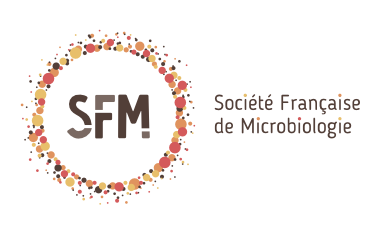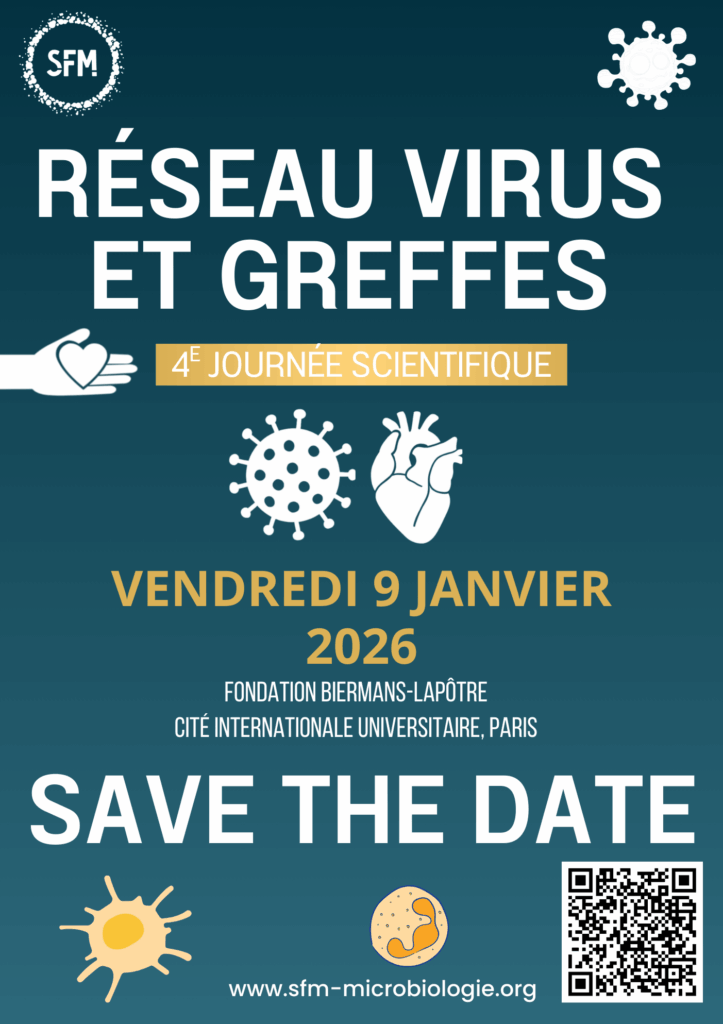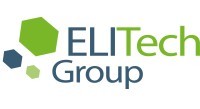Virus et Greffes 2026
Réseau Virus et Greffes
4e Journée Scientifique
Vendredi 9 janvier 2026
Fondation Biermans-Lapôtre, Cité Internationale Universitaire, PARIS
Le réseau Virus et Greffes organise sa troisième journée scientifique.
Cette journée a pour ambition de réunir tous les spécialistes impliqués dans la prise en charge des infections virales de patients ayant bénéficié d’une greffe de cellules souches hématopoïétiques ou d’une transplantation d’organe.
Elle permettra aux différents acteurs de faire le point sur plusieurs sujets fréquents ou plus rares, de débattre, et de réfléchir à des recommandations ou des projets de recherche collaboratifs.
Cette journée sera aussi l’occasion de valoriser le travail de jeunes biologistes et cliniciens sur cette thématique et de soutenir de jeunes investigateurs dans des projets de mobilité.
The Virus and Transplantation Network is organizing its third scientific day.
This event aims to bring together all specialists involved in the management of viral infections in patients who have undergone hematopoietic stem cell transplantation or organ transplantation.
It will provide an opportunity for various stakeholders to review several common or more unusual topics, to debate, and to consider recommendations or collaborative research projects.
This day will also be an opportunity to highlight the work of young biologists and clinicians on this topic and to support young investigators in mobility projects.
Comité Scientifique
Guislaine Carcelain Immunologie
Sophie Candon Immunologie
Alienor Xhaard Greffe CSH Adulte APHP (Saint-Louis)
Arthur Sterin Greffe CSH Pédiatrie Marseille (APHM)
Florence Ader Infectiologie
Hannah Kaminski Néphrologie Adulte Bordeaux
Olivier Thaunat Néphrologie Adulte Lyon (HCL)
Julien Hogan Néphrologie Pédiatrie APHP (Robert Debré)
David Boutolleau Virologie APHP (Pitié)
Samira Fafi-Kremer Virologie
Jérôme Le Goff Virologie
Programme
Programme préliminaire
Session 1
Prévoir et prévenir les réactivations virales
- Cibles thérapeutiques des immunosuppresseurs et réactivations virales.
- Anticorps neutralisants anti-BKV
- Panel discussion
Session 2
- Recherches originales des jeunes investigateurs
Session 3
Infections à Adénovirus
- Réplication – cibles des antiviraux
- Adenovirus post greffe de cellules souches hématopoïétiques
- Table ronde sur la prise en charge des infections à Adénovirus
Session 4
- Travaux du Groupe de Travail Virus et Greffes
Bourse de mobilité
Objectif : Apporter un financement personnel afin de soutenir une mobilité pour réaliser un projet de recherche sur la thématique Virus et Greffes.
Critères pour candidater
- Ancien interne en médecine, biologie ou pharmacie (post-internat, CCA, AHU, praticien attaché, PHC, PH, MCUPH, docteur en sciences ou en cours de thèse d’Université (2ème ou 3ème année). Les internes ne peuvent pas candidater.
- Projet de mobilité pour réaliser un projet de recherche sur la thématique Virus et Greffes (une demande de financement pour une fin de thèse pourra être considérée)
- Accord du laboratoire d’accueil
- Début du projet avant juin 2027
Les projets de recherche qui n’incluent pas les deux thématiques des infections virales et de la transplantation ne sont pas éligibles.
Modalités de soumission
Projet dans un document de 10-15 pages, incluant un résumé en français et anglais de 300 mots, le projet de recherche, les critères de faisabilité, une description du laboratoire d’accueil, les résultats attendus 12 mois après le début du travail dans le laboratoire d’accueil, le coût estimé de la mobilité (hors coûts de fonctionnement du projet), les financements complémentaires obtenus et/ou demandés, le projet professionnel suivant le retour.
Les documents suivants devront être envoyés à comptabilite@sfm-microbiologie.org dans un seul dossier intitulé VIRUS&GREFFES_2026_NOM-PRENOM :
- Projet
- CV
- Copie du contrat en cours
Date limite d’envoi du dossier : à venir
Livrables
- Envoi d’un rapport sur le travail réalisé et résultats obtenus au comité scientifique du groupe de travail Virus et Greffes dans les 3 mois suivant le retour de la mobilité
- Conférence à la journée Virus et Greffes l’année suivant le retour de la mobilité
- Soumission des travaux à au moins un des congrès des sociétés savantes (SFM, SPILF, SFI, SFT, SFGM-TC)
- Mention dans les communications dans les congrès et dans les publications du soutien financier du groupe de travail Virus et Greffes/SFM
Critères de sélection
Un jury composé des membres du comité scientifique du GT Virus et Greffes examinera les candidatures. Les membres du comité scientifique présentant un lien avec un ou des candidats ne participeront pas au jury. Le comité scientifique fera appel à des rapporteurs au sein du jury et à des rapporteurs externes.
Le jury considérera les critères suivants pour attribuer la bourse :
- Qualité du projet scientifique
- Faisabilité du projet sur une période 12 mois
- Niveau d’expertise du laboratoire d’accueil
- Pertinence de la mobilité dans le projet professionnel
- Co-financements
Montant de la bourse et disponibilité
Le montant de la bourse sera d’un montant de 30000 euros. Elle sera versée en 2 fois, le jour du début de la mobilité et 4 mois après.
Objective:
Provide personal funding to support mobility for conducting a research project on the theme of Viruses and Transplantation.
Eligibility Criteria:
- Former medical, biology, or pharmacy interns (post-internship, CCA, AHU, patrician attaché, PHC, PH, MCUPH, PhD, or currently pursuing a university PhD (2nd or 3rd year)).
- Mobility project aimed at conducting research on the Viruses and Transplantation theme (a funding request for the completion of a thesis may be considered).
- Agreement from the host laboratory.
- Project must start before June 2027.
- Research projects that do not include both viral infections and transplantation themes are not eligible.
Submission Guidelines:
The project should be submitted as a document of 10-15 pages, including:
- A 300-word summary in both French and English.
- The research project, feasibility criteria, a description of the host laboratory, expected results 12 months after starting work in the host laboratory, estimated mobility costs (excluding operational costs), additional funding obtained and/or requested, and the professional plan following the mobility.
- Documents should be sent to comptabilite@sfm-microbiologie.org in a single file titled VIRUS&GREFFES_2026_LASTNAME-FIRSTNAME:
- Project
- CV
- Copy of current contract
Submission deadline: Details coming soon
Deliverables:
- Submission of a report on the work carried out and results obtained to the Scientific Committee of the Virus and Transplantation working group within 3 months following the end of the mobility.
- A conference presentation at the Virus and Transplantation day the year following the return from mobility.
- Submission of the work to at least one of the scientific society conferences (SFM, SPILF, SFI, SFT, SFGM-TC).
- Acknowledgment of the Virus and Transplantation/SFM working group’s financial support in congress presentations and publications.
Selection Criteria:
A jury composed of members from the Virus and Transplantation Scientific Committee will review the applications. Committee members with ties to candidates will not participate in the jury. The jury may consult internal and external reviewers. The following criteria will be considered for awarding the grant:
- Quality of the scientific project.
- Feasibility of the project within a 12-month period.
- Expertise level of the host laboratory.
- Relevance of mobility to the candidate’s professional project.
- Co-funding sources.
Grant Amount and Availability:
The grant will be awarded in the amount of 30,000 euros, disbursed in two installments: the start date of mobility and 4 months later.
Appel à communications
Une session de communications libres sur cette thématique donnera la parole à de jeunes investigateurs (biologiste ou clinicien de moins de 35 ans).
Date limite d’envoi des résumés : à venir
Prix de la meilleure communication :
Prix réservé aux jeunes de moins de 35 ans membre d’une société savante 2023 ou 2024 (SFM, SFI, SPILF, SFGM-TC, SFT, SFV, SFNDT)
1er prix : 500 € + cotisation junior 2024
2ème prix : 300 € + cotisation junior 2024
Call for Abstracts
A session of open communications on this theme will give the floor to young investigators (biologists or clinicians under the age of 35).
Deadline for abstract submission: Details coming soon
Best Communication Award
This award is reserved for young members under 35 who are members of one of the following scientific societies in 2024 (SFM, SFI, SPILF, SFGM-TC, SFT, SFV, SFNDT).
- 1st Prize: €500 + 2025 junior membership
- 2nd Prize: €300 + 2025 junior membership
Inscription /Registration
| Catégogie | Tarif |
| Non-membre | 60 euros |
| Membre SFM et des sociétés savantes SPILF, SFI, SFGMTC, SFT, SFNDT | 20 euros |
| Interne membre SFM et des sociétés savantes SPILF, SFI, SFGMTC, SFT, SFNDT | Gratuit |
Pour les membres des autres sociétés savantes SPILF, SFI, SFGMTC, SFT et SFNDT merci de transmettre un justificatif à comptabilite@sfm-microbiologie.org avant de vous inscrire, pour bénéficier des tarifs préférentiels.
Informations pratiques
Fondation Biermans-Lapôtre, Maison Internationale Cité Universitaire Internationale, 9 Bd Jourdan, 75014 Paris




